 Return to Genesis of Eden?
Return to Genesis of Eden?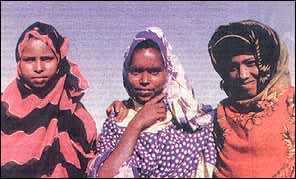
As part of the initiation rite, these girls have little choice
but to undergo circumcision.
13 December, 2000 Kenyan girls win circumcision ban
Female Circumcision: A Summary - (Jan Goodwin Price of Honour)
A major campaign of Saadawi's organization before the government closed it was to halt female circumcision. "The majority of rural Egyptian women are still circumcised. Here they remove only the clitoris; they do not do the much more extensive procedure, but even so, there are many problems. Infection, bleeding, damage to the urinary tract, sepsis, even death. Later, it may cause pain during coitus, and psychological damage. In the villages it is performed on girls just before puberty, by untrained village midwives using any kind of knife or razor, without painkillers, and in unsanitary conditions. In the middle and upper classes, it may be carried out by a doctor. The reasons given for clitoridectomies in Egypt are 'cleanliness,' and 'so that girls will not run after men."' In many societies, it is also believed that if the baby's head touches the clitoris during delivery, the infant will die.
Female circumcision is frequently described as an "age-old Muslim ritual," when in fact it predates Islam and is even believed to be pre-Judaic. There is no mention of it in the Koran, and only a brief mention in the authentic hadiths, which states: "A woman used to perform circumcision in Medina. The Prophet said to her: 'Do not cut severely, as that is better for a woman and more desirable for a husband.' But because of this still debated hadz'th, some scholars of the Shari school of Islam, found mostly in East Africa, consider female circumcision obligatory. 'I'he Hanafi and most other schools maintain it is merely recommended, not essential. In the nineteenth century, women in the United States and Europe were sometimes circumcised because it was believed to relieve epilepsy, hysteria, and insanity.
Today, an estimated one hundred million women have undergone the sexual mutilation. It is performed in many African countries, including Sudan, Somalia, Ethiopia, Kenya, and Chad. It is also a tradition among Muslims in Malaysia and Indonesia, and in a number of countries in the Middle East, including Egypt, the UAE, and parts of rural Saudi Arabia. Coptic Christians in Egypt and animist tribes in Africa as well as Muslims, undergo the ritual. More than 90 percent of Sudanese women undergo the most severe form of circumcision, known as "pharaonic," or infibulation, at the age of seven or eight, which removes all of the clitoris, the labia minora, and the labia majora. The sides are then sutured together, often with thorns, and only a small matchstick-diameter opening is left for urine and menstrual flow. The girl's legs are tied together and liquids are heavily rationed until the incision is healed. During this primitive yet major surgery, it is not uncommon for girls, who are held down by female relatives, to die from shock or hemorrhage of the vagina, urethra, bladder, and rectal area may also be damaged, and massive keloid scarring can obstruct walking for life. After marriage, women who have been infibulated must be forcibly penetrated.
"This may take up to forty days, and when men are impatient, a knife is used," recounted Sudanese women at a conference that I attended several years ago in Cairo on the "Development of Women in the Islamic World." They also told of special honeymoon centers built outside communities so that the "screams of the brides will not be heard." At this time also, the risks of infection and hemorrhaging are high. During childbirth, the scar tissue must be cut and the opening enlarged, otherwise mother and child may die. In the mid-eighties, American Nursing magazine began advising medical practitioners in the United States how to treat such patients, since the influx of women from countries where circumcision is standard meant that U.S. health-care providers were now seeing them in hospitals here. And if such cases are not handled correctly, major complications can ensue. The tradition of female circuincis'on in many countries is so strong that circumcised women even in the United States usually request reinfibulation after each delivery.
Nawal El Saadawi 1980 The Naked (Hidden) Face of Eve
Alice Walker 1991 Possessing the Secret of Joy
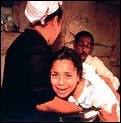 Circumcision
in Religion: Judaism, Christianity and Islam
Circumcision
in Religion: Judaism, Christianity and IslamI docunent the traditional religious history of circumcision.
As a male circumcised against my will, I request all religions to cease the practice of circumcision, even for men, to act as a good example against this practice of sexually-exploitive mutilation.
Abrogating
Religious Laws which permit Violence to the Female
Help me abrogate
violent laws in ancient texts by supporting
the Renewal.
Help me oppose the torture of women by fundamenalists
worldwide.
You don't have to believe in me, just support me and I
will stand against injustice against the female.
Disembowelling
Pregnant Women in Algeria 200 killed in a Week.

In the 12-week old fetus it is impossible to distinguish
male penis from female clitoris.
Neither is "unclean". (The Human Body BBC)
Marcus Maybury and David Hecht - 27th November 1996
On a cloudy afternoon last month, thousands of women danced through the shabby streets of Freetown, Sierra Leone. Most were members of Bundo, a female secret society whose initiation rite includes female "circumcision' - removal of the clitoris, cutting of the labia or stitching up the genital lips. Uninitiated girls led tile throng, followed by elders and a sea of women singing, ringing bells and beating drums. It felt like a party - until the parade reached Dr Olayinka KosoThomas' clinic. There the crowd angrily chided KosoThomas, a critic of female circumcision, calling her ogborrka - uninitiated and dirty. They laid cursed charms at the clinic door and waved' placards that read Agent Of The West. Then the mob began to chant, "Let's circumcise her here and now." Practitioners of female circumcision are striking back in Sierra Leone. The procedure is common throughout Africa, a rite of passage from adolescence to adulthood in countries as disparate as Egypt, Kenya and Liberia. Since the early 90s, Western development agencies and women's groups have criticised the practice, arguing that it brutalises women and puts their health at risk. They claim that as many as 130 million African women from at least 22 countries have been cut.
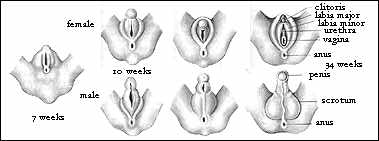
The natural homology between the sex organs is not dirty or uninitiated.
It is central to the way human society evolved through the independence
of women to
unite sexually with the partners they 'love' through both sexes
retaining the germinal clitoris.
Various forms of circumcision and infibulation vary from Muhammad's
warning
'reduce, but do not destroy' - clearly intended to leave at
least part of the clitoris
- to full infubulation, removal of external genitalia and stitching
up the labia
to prevent unwanted pregnancy. There is a bloodthirsty rite associated
with infibulation in which the husband runs through the streets
holding the bloodstained dagger to declare he has 'opened' his
wife
for conception. Subincision is also practiced by Amazonian tribes.
Estimates of the number of adolescents in Africa who undergo the procedure each year range as high as two million. The women often contract septicaemia, tetanus or gangrene. They may develop difficulty in urinating and chronic pelvic infections. Amnesty International recently recognised female genital mutilation as a human rights violation, and the ttnited States and other Western countries have begun granting asylum to women who fear that they or their daughters would be circumcised if forced to retum home. For Bundo members, the fear is that African elites, who do not usually engage in the practice, will be influenced by the campaign against circumcision and attempt to curb it. "We will continue to do it no matter what people say," insists Ines TomaElias, a Bundo elder and the mayor of Bo, the country's second largest city. What are the Bundo protecting? Their secrets, they say. The society constitutes 90 per cent of the women of Sierra Leone and is-a powerful traditional institution, respected and feared by the male dominated establishment. Every year Bundo elders take pubescent girls deep into the bush for several weeks to receive teybos, or things that are forbidden to discuss with the uninitiated, particularly men. "All you can know is thatwhen the girls retum they are women," says Toma Elias.
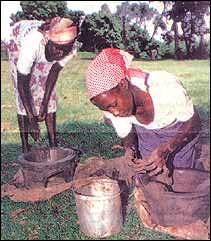
These Kenyan women are among the 130 million African women
whose culture demands that they be circumcised.
Even some anti-circumcision Africans say the Western critics have got it wrong. Aja Tounkara Diallo Fatimato, a Guinean gynaecologist, opposed the practice on health grounds. Still, Dr Tounkara, who was circumcised as an eight-year-old, says, 'Westerners think African men force us to do it. They say only Muslims do it ... [They say] we cannot experience sexual pleasure - they don't know what they are talking about." In Sierra Leone, the debate is further complicated because the Bundo is a rare civic org in a virtually ungoverned society. Weary of the toll the civil war was taking on their families, the women of Sierra Leone united in 1994 to found a group called the Women's Forum to push for peace. Educated, mostly uncircumcised women organised nationally, while the Bundo mobilised locally, uniting women from both the rebel and the amiy camps. The Forum won support for intemationaflv supervised elections, and the first democratically elected govemment in nearly 30 years was installed in April. The fight over circumcision has cnished that solidarity. Local women politicians seeking the support of Bundo members are stirring fears that the campaign against genital mutilation is an attempt to abolish the secret society.
Circumcision opponents disagree. At her Freetown clinic , KosoThomas says, 'I am not against the Bundo secret society. I am against the suffering of the girlchild."

The female human has naturally evolved to have at least as intense
an orgasm as the male.
Sexual arousal is accompained by blood flow to the labia and clitoris
just as it is to the penis.
This is central to the nature of human courtship and the expression
of bonding between the sexes.
It is not something 'unclean' or 'inappropriate' about the female
anatomy.
The most thorough method of securing the virginity of the bride
is by the operation of infibulation (see below). This is a variety
of female circumcision. As with innumerable other primitive practices,
it has become adapted to a purpose the very opposite of that which
originally led to its adoption. Unless special means are employed,
as is done in all primitive societies by the introduction of a
foreign body or by immediate sexual intercourse, female circumcision,
when completely carried out in its original form, results in an
occlusion by cicatricial tissue more complete than that presented
by the hymeneal membrane. In Egypt,
where, in the lower classes, the operation is usually carried
out by a barber, who, seizing all the soft parts in one hand,
cuts them at one stroke with a razor, adhesions invariably result
which necessitate considerable cutting at the time of the first
delivery. The original intention of the operation having long
since become obsolete, the cicatricial closure has been utilised
as a means of securing virginity; the formation of adhesions is
encouraged by immobilising the parts or by stitches, only a small
opening being contrived by inserting a quill during the healing
process. The practice is universal in Nubia, south of Gebel Silsineh
and in the Sudan, and is also in use in Abyssinia, Somaliland
and West Africa. In some parts of Darfur and Kordofan no girl
can find a husband unless she has undergone the operation. The
assistance of a midwife has generally to be invoked in order to
render possible the consummation of the marriage, and the operation
is frequently repeated after each confinement. In some places
the husband ceremonially rushes through the streets with a bloodied
knife to announce he has impregnated his wife. The introduction
of the practice is generally set down by writers to the Arabs;
but this is denied both by the Arabs and by the natives. Infibulation
is condemned by Muslims. (Briffault 3 344)

Waris Dirie recalls the horrors of her childhood-mutilation
and reveals the enigma for her and exreme difficulty of sexual
pleasure.
She had to be operated on as an adult before she could have sexual
relations.
For a live commentary get a Genesis
CD
NZ Herald Nov 98 Dirie's mother believing she was doing the best thing for her daughter, walked her into the brush, held her down and told her to bite on a root. A gypsy woman cut at the lithe girl's genitalia, using a dirty, broken razor blade. "I heard the sound of the dug blade sawing back and forth through my skin," Dirie writes in Desert Flower. The woman used thorns from an acacia tree to puncture holes in her sldn and sew her up, leaving a tiny hole the diameter of a matchstick, through wlich urine and menstrual blood could dribble. My legs were completely numb, but the pain between them was so intense that I wished I would die." Five-year-old Wans was left in a hut to recuperate, her infibulation. Two cousins died from infection after the procedure, carried out to ensure virginity and make girls marriageable commodities. Uncircumcised girls are seen as unclean and treated as outcasts. For more than 20 years Dirie suffered health probleim and side-effects from , her radical circumcision. Menstruation was a long, agonising process each month, as the menstrual blood backed up in her body. Finally she got up courage to visit a London doctor who operated to make the aperture more of a normal size. Writes Dirie in Desert Flower. "Waris was a new woman. I could sit down on the toilet and pee whoosh! There's no way to explain what a new freedom that was.' But the doctor could not undo the damage which had been done to her genitalia during the circumcision It's when we touch on the subject of sex that Dirie becomes agitated. "Please," she implores, "lefs not talk about that. Just use your imagination." It doeswt take much. Women who have been htibulated, the most extreme form of FGM, have had their entire clitoris, labia minora and the inner surface of the labia minora removed. They will never enjoy a normal sex hfe, never experience an orgasm, something most New Zealand women woldd find mcomprehensible. In Desert Flower Dirie is more forthcoming about her. jazz musician boyfrined and father of her 17-month-old son, Aleeke. "Besides the health problems that I still struggle with, I will never know the pleasures of sex that have been denied me," she writes. "I feel incomolete, crippled and knowing that there's nothing I can do to change that is the most hopeless feeling of all. When I met Dana, I fmally fell in love and wanted to experience the joys of sex with a man. But if you ask me today, 'Do you ENJOY sex?' I would say not in the traditional way. I simply erjoy being plhysically close to Dana because I love him.' For Dirie the effort of sharing something which has troubled her for so long and affects her life every day is tough. "It never gets easier. It is emotionally draining to talk about something which has been locked deep for so long." But for the esdmated 130 million women who have already been circumcised and the 6000 girls a day who have FGM performed on them, Dirie keeps going, keeps going, keeps travelling. "The hardest part is to start somewhere. Everybody is waiting, they don't kncvw what to do. The West are aware of the problem. But they're told to back off, it's none of your business."
A Shrine to the Pain of the Girl Child
The following is a shrine to the unnecessary and unspeakable pain of the girl child.


Girls wait to be circumcised.
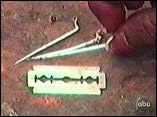
Any objects on hand in any condition are used. The tradtion passes
responsibility to older women to mutilate the young ones of their
own sex so that they will not be unclean in the eyes of the men.
The source is the desire of the men to control the fertility of
'their' females, even at grave risk and human bondage and misery.
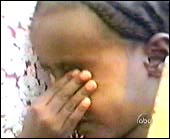

Faces of misery


A girl is dragged to a place to lie down. A girl has her leggs
trussed together.
Girls frequently die from loss of blood or from infection.
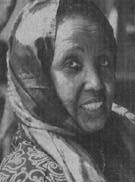 Hawa Adan Mohamed was
born and raised in Somalia. At the age of 8 she underwent the
most radical form of mutilation practised infibulation. Performed
by her aunt in a small village, the procedure was carried out
without anaesthetic, using basic cutting tools and thorns. "You
know in Somalia, circumcision is such a deep deep part of a girl's
life. From the moment we are crawling we know about circumcision,
we know that our gran(hnother and mother and sisters are circumcised
and we look forward to it being done. Back then, no one would
even dream of not being circumcised.' Hawa Adan Mohamed's struggle
with mutilation was a long and brutal one suffering many of the
complications of the practice and losing an older sister who died
after the operation.
Hawa Adan Mohamed was
born and raised in Somalia. At the age of 8 she underwent the
most radical form of mutilation practised infibulation. Performed
by her aunt in a small village, the procedure was carried out
without anaesthetic, using basic cutting tools and thorns. "You
know in Somalia, circumcision is such a deep deep part of a girl's
life. From the moment we are crawling we know about circumcision,
we know that our gran(hnother and mother and sisters are circumcised
and we look forward to it being done. Back then, no one would
even dream of not being circumcised.' Hawa Adan Mohamed's struggle
with mutilation was a long and brutal one suffering many of the
complications of the practice and losing an older sister who died
after the operation.
"I have seen girls die after being circumcised, and the harmful effects go on and on, so I do feel much anger about it all, but I have no one to be angry at. 'You see, mothers always make sure their daughters are circumcised because they believe that this is the best for them. Despite the pain, I myself agreed with the practice because I thought that was best for me. "For example if a mother doesn't get her daughter circumcised, her daughter will be an outcast, no one will marry her and everyone would think she is a prostitute so it is a very difficult situation we can't be angry at anyone, because the mothers' intentions are good."
In her early 20s Hawa Adan Mohained travelled and studied overseas where she discovered there were other women who were not circumcised, and most importantly, other Muslim women who were not. Slowly she realised "how wrong the tradition was" and committed herself to the fight against the practice. In the early 70s she returned to Somalia and with a small group of women began her campaign. She was appointed director of women's education, the women's movement began to bring about change and in 1977 infibulation was declared illegal. Government money was provided to start an anti-mutilation campaign. With the outbreak of civil war in 1991, the campaign was disbanded and millions of Somalis fled the country, including Hawa Adan Mohained who, with her husband, went to Canada. There she worked in a group campaigning against mutilation among Somali refugees. "Circumcision is a very difficult and sensitive issue for refugees. Many doctors and nurses in Western countries don't know how to look after circumcised women and the women feel very shy and embarrassed seeking help. "Almost every refugee has faced so much pain and trauma and lost so much anyway that working against circumcision can seem very insensitive in light of all their other terrible experiences so it must be approached with a lot of understanding." In 1995 Hawa Adan Moharned returned home, despite civil turmoil, to help her countrywomen. There she found a resurgence of the practice. "I was devastated by what I saw. It seems that we have gone back 40 years. Girls were being infibulated every day with razors and thorns. Two young girls recently died following the procedure and yet still many don't question it." Despite the horrors, she bears no anger toward the women who perpetuate the practice. "We cannot blame them because it is all they have ever known. Most of the women have never had any education on how harmful circumcision is. They believe that it is part of their religion and that the terrible pain is part of a woman's life. Many of the women have very little power and very little education. In this area, all the women need is education on circumcision.' So, despite civil war and lack of resources, that is what Hawa Adan Mohamed and 18 other Somali women in the town of Kismayo are now delivering. On a shoe-string budget from overseas supporters, they have set up a women's centre providing education programmes, small-business , a bakery and schooling for orphans. 'Our message to them is that circumcision is very very harmful, that it is bad for our daughters, that it is not part of our religion and we must give it up.' Pictures of families that have given up mutilation now line Hawa Adan Mohamed's makeshift office. The 60year-old has many hopes for the future, including that Somalia will be a land of peace and that the women's programme will grow and receive more money. But her dream is simple: "My dream is that in my lifetime there will be young girls living in the heart of Somalia who can run free and play without pain, without the cruel and devastating effects of circumcision. Even just a few. Even 10." NZ Herald 25 Nov 98
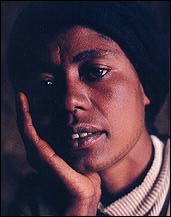 Zenebu Tulu (Women
in the Material World, Faith d'Aluisio and Peter Menzel, Sierra
Club Books, SF 70)
Zenebu Tulu (Women
in the Material World, Faith d'Aluisio and Peter Menzel, Sierra
Club Books, SF 70)
"The others would laugh at Like when she goes to school if she were not circumcised. It isa humiliation, not circumcising a daughter. It is terrible not to."
At the age of 18 Zebebu Tulu was kidnapped by her future husband, Getachew (Getu) Moneta, and taken to his brother's home. Tradition forbade the tearful Zenebu from returning to her parents and the pair was married after negotiations between the two families. Such forced unions are not uncommon in Ethiopia, where men often have near-total control over women's lives. For Zenebu, now 29, the abduction is a distant memory. For Getu, 32, it is a source of embarrassment-a reminder that he was "ignorant" as a young man.
The couple and their five children live in a fanu'ly compound in the village of Moulo-a two-hour drive from Ethiopia's capital city of Addis Ababa-with Getu's parents, siblings, and grandmother. Their home is made of sticks cemented with mud and cattle dung; it leaks during the rainy season and needs constant work. Zenebu struggles to keep the yard clean and says her dream is to have "a very good yard and a garden." On Sundays, she attends services at an Ethiopian Orthodox church - a brief respite in a week of constant toll. Zenebu's biggest help is her daughter Like (pronounced " lee-kay"), 10, who spends the day pounding grain and pressing fresh dung into the wans of their home (inset). Like dreams of going to school like her brother, Teshome, 12, an avid student who wants to become a teacher, but Zenebu says she needs the girl at home and that in any case the family can't pay her school fees. Asked if she thinks life will be better for her children, Zenebu, proud of her son's progress, says that she hopes it will, but is inclined to believe that not much will change.
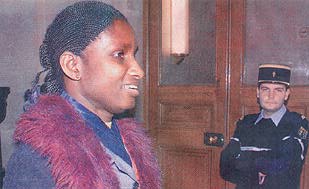
French FGM Case Ends in Trial and Sentence feb 99 PARIS - 'My mother had told me she was taking us there to have injections. But then I heard my sister Sira scream," the softly spoken young woman told the court 'Now it was my turn. There were several women. They forced me to lie down. One held my legs, the other held my arms. The third bent down and then cut out my clitoris. I screamed, and asked my mother why she hadn't said to stop them. She cried when she saw me." Sitting in the dock just five metres away from Mailatou Koita were the parents who last saw her on her 18th birthday and are accused of being accomplices in the act that ruined her life.
The main accused is Hawa Greou, 52, a . Frenchwoman of Malian origin known in her community as Mama Greou. Accused of having cvarried out scores of female excisions over the past five years, she faces charges of inflicting voluntary irjury causing mutilation or permanent disability, which cames a jail term of up to 15 years. The other defendants are five fathers and. 22 mothers.
It is due to the 'courage of Mariatou that the authorities have been prompted 'into launching the crackdown. Koita underwent excision at the hands of Mama Greou at the age of eight. Over the years, she bore her suffering in silence until the circumcision of her younger sister Mariam prompted her to go to the police. By becoming an infomer, she gave investigators a vital lead on the shadowy practice but also became an outcast in her community and brought shame upon her family. After Koita flied her complaint police identified 48 girls between one month and 18 years old who had been taken to Greous Paris flat for excision, a figure disputed by the Abolition of Genital Mutilation group, which says the figure is is closer to l00.
Investigators found creams compresses, unsterilized razors allegedly used in the operations, as well as an instrument made of two metal spikes fixed to a plastic tube. Greou often carried out the excisions, for 500 francs ($165) apiece, during the holidays - when Paris is virtually deserted, so, that few people would hear the girls' screams. 'I do it the way my mother -and my grandmother did it,' Greou reportedly told police. 'I cut out the clitoris, I take clean earth and mould it into a charm that I place on the chfld's sex." At the start of the trial she sobbed as she told the Court 'I am sorry if I have done wrong It is just a custom, I did not, do it to hurt anyone ... now I understand and we have to stop.
A court has handed down tough sentences in a land-mark trial of a Malian charged with mutilating young girls in the rite of female excision. Hawa Greou, 53, was handed an eight-year term for practising excision on 48 girls, while the mother of a young woman who had been mutilated by Greou was given a two-year term for failing to come to her daughters aid. Twenty-six other defendants, from Mali, Senegal, Gambia and Mauritius were given suspended terms ranging from two years to five years for abetting the mutilation.
Togo bans female genital mutilation Nov 98 LOME, Togo (Reuters) - Parliament in the west African nation of Togo has passed a law banning female genital mutilation and setting prison terms or fines for those who carry out or encourage it. The parliamentary human rights commission said studies concluded the practice, known as female circumcision, was not supported on religious or cultural grounds and was an attack on its victims' physical integrity. It said the mutilation, which typically involves removal of all or part of the clitoris, was particularly widely practiced among the country's Muslims, affecting two women out of three.
New Zealand passed a private members bill to ban female circumcision at the behest of Christine Fletcher.
Jan 99 Senegal joins Burkino Faso, Central African Republic, Dijbouti, Ghana, Guinea Conkery, and Togo in outlawing circumcision.
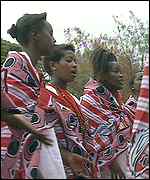 Wednesday,
13 December, 2000, 15:51 GMT
Wednesday,
13 December, 2000, 15:51 GMT
Kenyan girls win circumcision ban
Case could heighten war against female circumcision For the first time in Kenya, two teenage schoolgirls have won a court order preventing their father from forcing them to undergo female genital mutilation, traditionally known as circumcision.
A court in Rift Valley Province issued a permament injunction on their father, Pius Kandie, stopping him from allowing his daughters - 17-year-old Ednah and 15-year-old Beatrice - to undergo the process without their consent.
The magistrate Daniel Ochenja ordered the father to continue providing financial support for the girls, who are still living in the family home.
The order has been welcomed by human rights activists as an important step towards ending the practice, which remains widespread in much of rural Kenya.
Historic case
The Centre for Human Rights and Democracy in Kenya helped the girls bring the case.
The girls' lawyer, Ken Wafula, has termed the case historic saying it would encourage other girls in the province, who are forced into circumcision, to make a stand against the practice.
He told the BBC that the two sisters considered the practice outdated and repugnant to justice and morality in the 21st century.
The human rights group says girls from the Kalenjin tribe are normally subject to circumcision and immediately forced into sexual activities or marriage.
This, says Mr Wafula, disrupts their academic growth, exposes them to unwanted pregnancies and the deadly disease, Aids.
 Monday,
September 6, 1999 Published at 14:09 GMT 15:09 UK
Monday,
September 6, 1999 Published at 14:09 GMT 15:09 UK
Kenya: Changing attitudes to female circumcision
By BBC correspondent Cathy Jenkins in Nairobi
Agnes Poroi is the sort of teacher who oozes warmth and practical common sense. She needs to, because her subject is the most sensitive and the most controversial she could ever have to deal with in this part of East Africa.
She is explaining to a class of 37 girls the dangers of female circumcision, commonly known in health circles as female genital mutilation.
"What does the clitoris do?" she asks the girls, and a dozen hands shoot up. "Yes," says Agnes "it sends messages to the brain. Look at me, I've been circumcised, I don't have a key to start my engine".
Agnes goes on to list some of the side effects: trauma, bleeding, difficult childbirth. Then she tells the girls, in no-nonsense terms, what she remembers of her circumcision day.
"Painful, yes, it was painful what happened to me that early morning. The old mama came, she was very fat. In the first place I was taken outside. No one talked to me. Everyone was rough to me because there was something that was going to happen to me, and they wanted me to be brave."
The old mama whom Agnes was refering to was the old woman who carried out the circumcision. It is a tradition which is still widely practised by many of Kenya's tribes.
The most basic type of circumcision is the "sunna", where the covering of the clitoris is removed. Among Agnes's tribe, the Masai, circumcision is more severe. It involves the cutting away of the whole clitoris, together with the labia majora and the labia minora.
Traditionally, a Masai girl is circumcised before she is married, and that can be from a very young age. During the ceremony, the girl is expected to remain silent. To cry would be a sign of weakness.
Agnes works for an organisation called Maendeleo ya Wanawake, which means the Development of Women - it is trying to stop the practice in Kenya. But so sensitive is the issue that campaigners cannot approach it head on.
Instead they are using education and economic factors as a lever. Among the Masai community, parents are increasingly eager for their daughters to finish school because this increases their chances of earning money for the whole family.
But the problem is that once a girl is circumcised, she drops out of school to get married. Her earning power drops to nil.

"I had to go around the area for one year without even mentioning female circumcision" says Agnes. "I just had to go round saying to parents 'I'm here and I want to know why your girls are dropping out of school; what will you think if they're not the teachers of tomorrow, not the doctors of tomorrow?' Slowly it came from the parents themselves. 'What about this circumcision. It makes them drop out of school.' "
The parents of the girls in Agnes's class have been convinced. Instead of having their daughters circumcised, they have sent them to Maendeleo ya Wanawake. Over the course of a week with the organisation, the girls are taught what their community expects of them as adults.
Then at the end there is a ceremony of singing and dancing. It is a rite of passage for the girls and marks their passage from childhood to adulthood. But they have become women without being cut.
Dorcas Samante is very happy about it. She is twenty, and first heard about the dangers of circumcision when she was at school. But she only avoided circumcision because her uncle, who brought her up, is an urban, educated man who was already convinced.
Dorcas needed his support because among Masai it is the men who make all the decisions. But Dorcas knows that many of her former schoolfriends do not understand her.
"They see me as odd" she says. "They keep away from me. But I'm proud. Perhaps I'm an unusal woman here, but there is an outside world and I know that it will agree with me."
Watching the ceremony is Mary Karanja, the mother of another of the girls, Esther. Mary is beaming with delight. She says that she was circumcised in 1956, but none of her six daughters has been cut.
"I realised when my first child was born that I had difficulty. I am very happy about this ceremony" she says.
But these are small numbers yet, and the campaigners know that some of the girls at their ceremony may yet come under pressure to be circumcised. But they are also prepared to work very carefully and patiently. They say that this is the only way to change attitudes.
Reunion with Eden - Sakina
Epiphany 2000 Jerusalem - please come!!
Daughters of Israel, Daughters of Palestine, Daughters of Eden,
Daughters of Gaea - please help
Spread the word - this is the final justice, peace and the reconciliation.
References